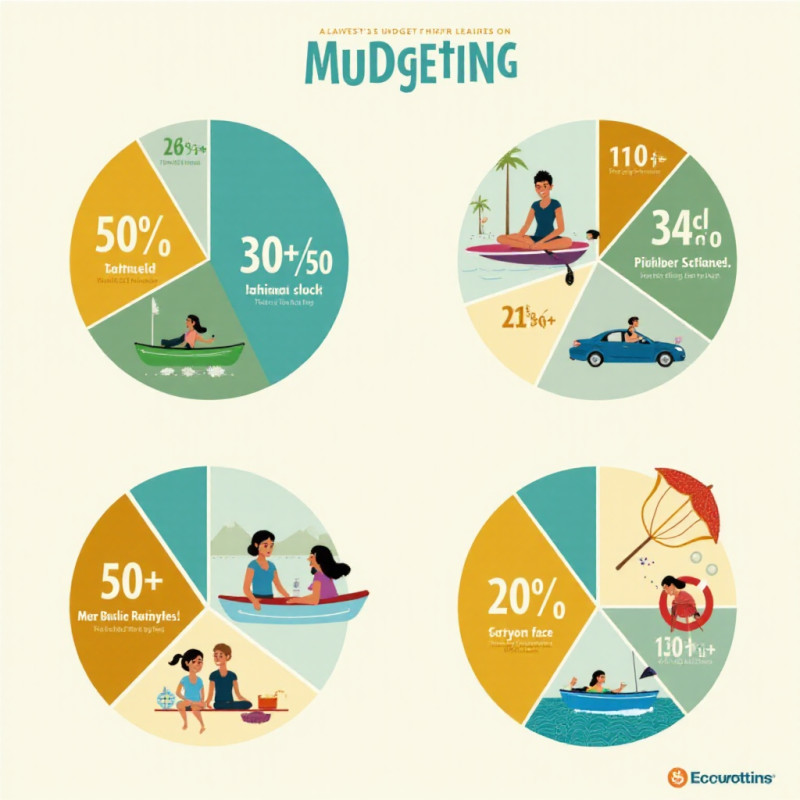Budgeting is an essential skill you can develop to help manage your money effectively! In this article, we’ll explore the basics of budgeting, why it’s important, and simple strategies to help you get started. Whether you want to save for something special, pay down debt, or simply learn to live within your means, this guide will give you all the tips you need to take control of your finances.

Understand Your Income
Before you start budgeting, it’s important to know how much money you have coming in each month. This includes your salary, any side jobs, or passive income. Write down your total monthly income to kickstart your budgeting journey!
Track Your Expenses
Tracking your expenses is a crucial part of budgeting. Start documenting every dollar spent. Use apps, spreadsheets, or a simple pen and paper. This will help you see where your money goes and identify areas where you can cut back. It’s eye-opening!
Set Clear Financial Goals
What do you want to achieve with your money? Whether it’s saving for a vacation, buying a car, or paying off debt, setting clear financial goals gives you something to work toward and helps keep you motivated.
Create a Budget Plan
A budget plan outlines how you will spend your income. Allocate funds to essentials like rent, groceries, and bills first. Then, divide the rest among savings and fun activities. Make sure your budget is realistic and flexible!

Follow the 50/30/20 Rule
This popular budgeting rule suggests dividing your income into three parts: 50% for needs (like housing and food), 30% for wants (like entertainment), and 20% for savings and debt repayment. It’s an easy way to manage your finances!
Automate Your Savings
One effective way to save money is to automate it! Set up a system that transfers money from your checking account to your savings account every month. This way, you save without even thinking about it!
Review and Adjust Regularly
Your budget isn’t set in stone! Review it regularly, at least once a month. Check if you are sticking to your plan or if there are changes needed. Life happens, and it’s okay to adjust your budget as necessary.
Set Up an Emergency Fund
Unexpected expenses can throw a budget off track. That’s why having an emergency fund is important! Aim to save 3 to 6 months’ worth of living expenses to cover surprises like car repairs or medical bills.

Cut Unnecessary Expenses
Take a hard look at your spends to find unnecessary expenses. Subscriptions, eating out, and impulse buys can add up quickly. Consider options like cooking at home or using public transport to save money.
Stay Informed About Your Finances
Keep learning about personal finance. Read blogs, watch videos, or listen to podcasts that offer budgeting tips. The more you know, the better choices you can make with your money.
Use Budgeting Apps
There are many budgeting apps available that can help track your income and expenses. Apps like Mint, YNAB, or PocketGuard can make budgeting easier by automating tracking and providing reports.
Consider Cash Envelopes
The cash envelope system is a great way to manage your spending. Take cash for specific categories (like groceries or entertainment) and only use that cash. It can help you stay within your limits!

Plan for Irregular Expenses
Not all expenses are monthly, like birthdays, insurance payments, or car maintenance. Keep these in mind when budgeting. Save a small amount each month specifically for these expenses to avoid surprises.
Review Your Subscriptions
Subscriptions can sneak up on you! Monthly streaming services, magazine subscriptions, or apps can drain your budget. Review and cancel the ones you don’t use often to free up some cash.
Involve Family in Budgeting
If you’re managing a household, involving your family in budgeting is key! Discuss financial goals together and make spending decisions as a team. This way, everyone understands where the money goes!
Know Your Priorities
Understanding your priorities helps direct your spending. Identify what matters most to you—whether it’s traveling, saving for college, or buying a new gadget—and make sure your budget reflects those priorities.

Stay Motivated
Budgeting can be challenging! Keep your motivation up by celebrating little wins along the way—like saving a small amount or sticking to your budget for a month. Reward yourself without breaking the budget!
Learn About Credit Scores
Understanding your credit score is essential for your financial health. It affects loan approvals and interest rates. Get familiar with what affects your credit score and work on improving it over time.
Find an Accountability Partner
Having someone to support your budgeting efforts can keep you on track. It could be a friend or family member who understands your financial goals and can encourage you along the way.
Value Experiences Over Things
Instead of spending money on material items, consider spending on experiences—like trips, events, or classes. These experiences can bring more joy and help create lasting memories without always breaking the bank!
Conclusion
Remember, budgeting is a journey, not a destination. By incorporating these budgeting basics into your routine and making small adjustments along the way, you’ll become a budgeting pro in no time. Stick with it, and you’ll see the benefits in your financial life!
FAQ
What is budgeting?
Budgeting is the process of creating a plan on how to spend your money. It helps you allocate your income towards expenses, savings, and paying off debts.
Why is budgeting important?
Budgeting is important because it helps you manage your money, prepare for emergencies, and achieve financial goals without the stress of overspending.
How often should I review my budget?
It’s a good idea to review your budget at least once a month to ensure you’re sticking to your plan and make adjustments if needed.
Can I stick to my budget?
Yes! Sticking to a budget is possible with dedication, planning, and reviewing your expenses regularly to stay on track.
What if I go over budget?
If you go over budget, don’t be too hard on yourself! Review where you spent extra, adjust your budget accordingly, and focus on getting back on track.
